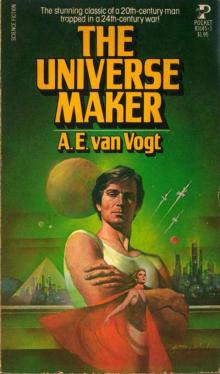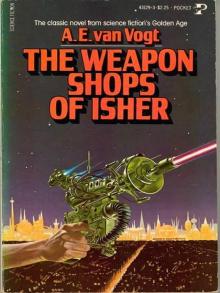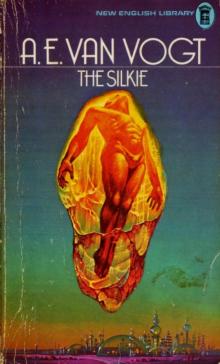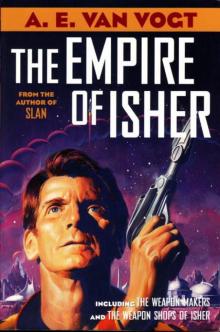The Problem Professor, page 1





The Problem Professor
A. E. van Vogt
‘The Problem Professor’ was originally published as ‘Problem Spaceship’ in Thrilling Wonder Stories Magazine, August 1949. Copyright © 1949 by Standard Magazines Inc.
Published in the short story compilation ‘The Gryb’ (1976)
* * *
v0.9 by Daj. This is a pre-proof release. Scanned, page numbers removed, paragraphs joined, formatted and common OCR errors have been largely removed. Full spell check and read-through still required.
* * *
Chapter 1 TEST RUN
Merritt recognized the crisis when VA-2 attained a speed of 4000 miles an hour.
Modelled on the German V-2 bomb, the rocket climbed towards the noonday sun on a column of crooked fire, as its gyroscopic stabilizers worked in their spasmodic fashion to balance the torpedo stucture.
Loaded with instruments instead of a warhead it shot up 764 miles. It topped the highest peak of the planet’s 500-mile-deep atmosphere. It broke into the emptiness of space and, for a few moments on the television screen near the launching rack, the stars showed as bright pinpoints against a background of black velvet.
In spite of its velocity it was never in danger of leaving Earth’s gravitational field. It came down. And, after they had exhumed the scarred shell from the desert sands, there was a meeting at which Merritt was appointed a committee of one. He was charged with the positive duty of persuading the government of the United States ‘to finance and build a spaceship capable of transporting human beings in and through the airless void above the atmosphere of this planet.’
The sum of one thousand dollars was voted him for initial expenses.
Merritt tiptoed into his apartment about two o’clock. His excitement, now that he was home and near Ilsa, subsided rapidly. As he undressed in the living room, using only one dim light, he wondered what Isla would think of his mission.
‘Bob, is that you ?’
Merritt hesitated.
‘What time is it, Bob?’
Merritt, carrying his shoes, trousers, coat and shirt, walked into the bedroom. Isla was sitting up, lighting a cigarette. She was a dark-haired olive-complexioned young woman with passionate lips. She put out her hand and Merritt handed her the cheque and, while she studied it, he climbed into his pyjamas and explained what it was for. She began to laugh before he finished, a staccato laugh.
‘With one thousand dollars,’ she said finally, controlling herself, ‘you expect to persuade a political government to build a machine more expensive than any battleship ever constructed. My dear, I was married to a Washington lobbyist and I assure you it isn’t done on the cheap.’
It was the first time in the four years since their marriage that she had mentioned her first husband. Merritt glanced at her sharply. He saw that her cheeks were flushed, that she was furious with him.
‘Really,’ she said, ‘I wish you wouldn’t waste your time with that bunch of dreamers. Spaceships! Such nonsense. Besides, what good is it? I wish you’d get busy and make some money for us.’
Merritt did not answer. He had a theory about money-making. But it was not one he could expound to a woman whose first husband had amassed a fortune after she divorced him.
He climbed into his bed. ‘You have no object, I hope,’ he said, ‘to my spending the thousand before I come around to your way of thinking?’
Ilsa shrugged. ‘It’ll give you a trip. But it’s so silly. What are you going to do first ?’
‘Go see a schoolmate of mine named Norman Lowery. He’s secretary to Professor Hillier, the mathematician and physicist. We have to build up to the President by degrees, you know.’
‘I’ll bet you do,’ said Ilsa.
She began to laugh again. She was still at it when Merritt made his first attempt to kiss her. She pushed him away.
‘Don’t try to get around me,’ she said bitterly. ‘I’m just beginning to realize that I’m doomed to be the wife of a low-salaried husband. You’ll have to be gentle with me while I get used to the idea.’
Merrit said nothing. Life had become progressively tense of recent months.
Almost, he had come to believe that men with obsessions shouldn’t marry. It was too hard on the w.man.
‘The trouble with you,’ said Ilsa, her voice softening, ‘is that you’re a living misrepresentation. You give the impression that you’re bound for the top but you don’t even try to get started.
‘Maybe I’m further along than you think,’ Merritt ventured.
‘Nuts!’
She finally let him kiss her - on the neck, not the lips. ‘I feel as if I would poison you after what I’ve said. And I’m not quite prepared for that yet.’
Norman Lowery met Merritt at the station. He looked older by at least ten years than when Merritt had seen him two years previously. He led Merritt towards an imposing Cadillac and, after they had started, said, ‘Don’t be too surprised when you see Professor Hillier.’
That was Merritt’s first inkling that something was wrong. ‘What do you mean?’ Sharply.
‘You’ll see.’
Merritt studied his friend’s profile in narrow-eyed thoughtfulness but he asked no questions. The big car was out of the town now, bowling along a paved highway at sixty miles an hour.
After about ten minutes it turned off into a valley and came presently to a little dream village. Several large buildings dominated the scene. And there were about two dozen houses in all, scattered along the banks of a pretty winding stream.
As Lowery turned up the driveway of the largest bungalow he said, ‘Prefessor Hillier is independently wealthy -luckily for him - and all this is his property. Those buildings over there are his labs. His assistants and their families live in the houses.’
He added, ‘Notice how we’re closed in by steep hills. That’s in case of an atomic bomb attack on the big dam twenty-five miles south. All the buildings, including the residences, are steel and concrete under their stucco exteriors and panelled interiors, though the professor only laughs at that in his sensible moments.’
Merritt did not like the reference to ‘sensible moments.’ As the car parked in the driveway he climbed out slowly and took another look along the valley.
He thought, ‘To me atomic energy is open sesame to the future. To these people - ‘
He wasn’t sure just what was wrong. But there was a pressing negativeness here as if a man had built himself a mausoleum and was waiting for death to step closer. Long before, Merritt had rejected headlong retreat from the vulnerable cities, had aligned himself with the hundred million whose only hope of escape was that their leaders would have the common sense to solve the problem of the doomsday bomb.
Merrit asked finally, ‘Has this place got a name ?’
‘Hillier Haven.’
At least it fitted.
They entered the house through french windows, which opened into a spacious living-room. There was a bar in one corner. Lowery ducked through an opening in its side and popped up behind it.
‘I’ll mix you a drink,’ he said, ‘then go look for the professor. This is his house, you know, or did I say that before? He and his daughter and Hive here. Very cosy.’ He laughed grimly. ‘What’ll you have ?’
Merritt had a whisky and soda. He sat down in an easy chair and watched Lowery disappear into the garden beyond the french windows. The minutes passed. After about half an hour he climbed to his feet and walked over to a half-open door that had been intriguing him for some time. It was a library lined with books. Merritt returned to his chair. He was an avaricious reader but not today - not this month.
Another half-hour went by. He could feel himself growing tenser. He had already paced the length of the room several times. Now he did it again but without any sense of relaxation.
He had a vision of himself during the next few months, waiting for men like Professor Hillier to condescend to give him a hearing. He began to realize the massiveness of the task he had set himself. He was going to try to push an idea into, men who had hacked their own way to success through the equivalent of granite.
Men whose characters were as different and inflexible as their achievements. Men of great talent and great power. He, Robert Merritt, who could scarcely pay his bills every month, was going to do all that.
‘We’re nuts!’ he thought. ‘The whole bunch of us. Imagine - a few hundred fanatics trying to push America into a spaceship! Ilsa was right.’
But he stayed where he was.
A door opened, and a girl came in. She was slim and blonde with grey eyes. She paused as she saw Merritt. She came forward, smiling.
‘You must be Robert Merritt,’ she said. ‘Norman told me about you. I’m Drusilla Julia, Professor Hillier’s daughter.’
She looked cool and refreshing and sane. Merritt answered her smile and said, ‘Your father must be a student of ancient Rome.’
‘Oh, you recognize the origin of my names.’ She was pleased.
After a moment however she frowned. ‘Norman has been telling me about what your club is trying to do. Just what are your plans ?’
Merritt told her what VA-2 had accomplished. He went on, ‘VB-Two is now under construction. It will be somewhat different from the first ship - ‘ he hesitated - ‘in that its acceleration will never be above six gravities.’
He watched her face to see if she had any inkling of what that meant. For a moment she didn’t seem to. And then her eyes lighted up.
She said in a low, intense to
Chapter II THE PROBLEM PROFESSOR
She didn’t look so old herself. About twenty-two, Merritt estimated sardonically. If the young people of this age were destined to explore the planets, then she could be right in there pitching. But he liked her for knowing something. The question most often asked him by people was, ‘But how can a ship fly in space where there’s no air for the explosions to push against.’ He saw that her enthusiasm was subsiding.
She said, ‘Actually, that isn’t what I meant when I asked you about your plans. What I want to know is what do you expect of Father ?’
Merritt explained that they wanted the famous Professor Hillier, atomic bomb scientist, to be ready to go to Washington at the proper time to help persuade President Graham to support Project Spaceship. When he had finished, the expression on the girl’s face was distinctly unhappy.
‘Can’t you,’ she asked, ‘obtain the support of some other scientist?’
Merrit said simply, ‘We need a household name. Years ago there was Edison, then it was Einstein, now it’s Hillier. You can’t fight a thing like that. It’s just so. Besides, some of the more famous atomic scientists will have nothing to do with the government since atomic energy was virtually placed under military control.’
He shrugged, ‘Naturally, since no secret is involved, our members basically support the scientists. But we’re willing to work with the material we have. We’ve found individual military men absolutely co-operative. They’ve given us German V-One and V-Two bombs.
‘Jet and other planes have been turned over to us in almost any quantity we could ever hope to need. The armed forces are full of young eager officers and men who are only too anxious for somebody to reach the planets.’
His voice was warming to the level of enthusiasm. He realized suddenly that he was being boyish. He stiffened.
He said quietly, ‘The world is as full as ever of the spirit of adventure. But people have to be cajoled and set on the right path to the future.’
‘My father,’ said Drusilla Julia Hillier, ‘is going to be difficult. I’ll be frank about that.’ She went on earnestly, ‘Mr Merritt, as you know, he was one of the atomic bomb scientists. After “the war he visited Hiroshima and - well, it affected him.
‘Norman and I have prepared a letter which we have already shown father, and which we are trying to persuade him to sign. So far he has not done so. I’m afraid it will be up to you to persuade him.’
The french windows opened and Lowery strode in. ‘ ‘Lo Dm,’ he said. He looked at Merritt. ‘Sorry, I’ve been so slow but it’s taken me all this time to locate the professor.’ His voice had a peculiar note in it, as he added, ‘will you come this way, and meet him in one of his favourite poses.’
The girl said, her colour high, ‘Be seeing you at dinner, Mr Merritt.’
Merritt went out, puzzled. Outside he began in an irritated tone, ‘For heaven’s sake, Norman, what’s going on here? This mystery is—’
He stopped. They had rounded a line of shrubs and there was a man lying on the grass under the trees. He was a gaunt old fellow with white hair, and a distinctively long head. His face was partly hidden by one arm. His expensive clothes were dishevelled and his posture twisted and ungainly.
As Merritt gaped in a gathering comprehension, Lowery said, ‘Liquor has been unfair to Professor Hillier. It just wasn’t meant for him. One or two glasses of the mildest concoctions and his whole system backfires like that. He’s very determined, though. He’s going to lick it yet, he says. Well, shall we go back into the house?’
Merritt went without a word. But he was thinking that getting a full-grown spaceship into the air was going to be more difficult than he had dreamed.
Professor Hillier came in to dinner. His eyes were quite bloodshot but he didn’t stagger. He shook hands affably with Merritt.
‘If I remember correctly,’ he said, ‘you came out and had a look at me. My daughter and her - ahem -1 believe they’re going to get married, but you never can tell about these moral young men - believe in letting visitors form their own conclusions. A very poor policy if you ask me. This world is too full of infidels and other non-drinkers.’
Merritt wasn’t sure just what he ought to say.
Before he could speak Drusilla said, smiling, ‘Father still lives in the era in which young people, when thrown together, automatically fall for each other. Norman and I have our own friends and personally I have yet to meet the man I am going to marry.’
Merritt glanced at his friend. Lowery was staring straight ahead with studied indifference and Merritt had his first realization of the situation that existed here. Boy loves girl but girl does not love boy. And the ass was making his situation hopeless by ageing under the strain.
They sat down to dinner. The professor said, ‘Who’s going to fly VB-Two?’
Merritt parted his lips to answer, then stopped himself, and looked at his host narrow-eyed. He couldn’t have asked for a better question but after what he had heard of this man he’d have to take care not to let himself be drawn into a trap. He replied cautiously:
‘The choice is between two men.’
He went on to explain the tests that had been given every member of the Rocket Club. The important thing was the ability to withstand acceleration. The army had several wonderful men whose anti-acceleration capacities were almost miraculous. Several of these had offered privately to perform the flight. But it had been decided not to use them for fear of arousing the ire of the high command.
‘So,’ Merritt concluded, ‘we’ll have to do it ourselves. A salesman, named John Errol, is the most likely man.’ He saw that it would be unnecessary to name the second in line.
‘What,’ asked Professor Hillier, ‘are your plans for getting to the President?’
Merritt was surer of himself now. At least he was getting a chance to explain. He said, ‘The route is rather complicated. We have selected key men whose support we feel we must get before we can even approach the President. We want to interest a top brass hat in both the army and the navy.
‘It happens that one of our members knows a high naval official who has practically guaranteed us support. But if the army should turn thumbs down it might stop us for years.
‘However, all that is still more than a month away. We all agree that we must first obtain the support of Professor Hillier. Unless some famous scientist will say that space flight is possible it will be difficult to convince the so-called hard-headed businessmen.’
Professor Hillier was scowling. ‘Businessmen!’ he snarled, ‘Yaahr
Merritt thought: ‘Oh-oh, here it comes.’
The professor had been eating with the concentrated intentness of a hungry man.
Now he paused. He looked up. His scarlet eyes gleamed.
‘This desire to go to the planets,’ he said, ‘is the neurotic ambition of supreme escapists from life.’
His daughter looked at Merritt, then said quickly, ‘That sounds odd, doesn’t it, coming from a man who has made a fortune out of exploring the frontiers of science and who, moreover, has hung on to his money with the skill of a hard-headed businessman.’
She added, addressing her father directly, ‘Don’t forget, darling, you’re committed to space travel. You’re going to write a letter.’
‘I haven’t written it yet,’ said Professor Hillier grimly. ‘And I am toying with the idea of not writing it. The thought that a scientist in his cups might stop man from reaching the stars fascinates me.’
The conversation had taken a turn that Merritt did not like. He recognized in the professor a man who had tossed aside his inhibitions late in life. Such people always overdid their freedom. And that was a danger.
‘Don’t you think, sir,’ Merritt said quietly, ‘that it would be more fascinating if-uh, a scientist in his cups were the key figure in reaching the planets. Fact is, that’s the only way it would ever get into the history books. It isn’t history if it doesn’t happen.’
Professor Hillier showed his teeth. ‘You’re one of these bright young men with an answer for everything,’ he said. He made it sound offensive. ‘Your attitude towards life is too positive to suit me.’

























